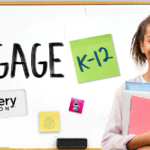Luke Rhine, Delaware’s Director of Career & Technical Education and STEM Initiatives, has had an interesting career, serving as a teacher in New Jersey and Maryland Public Schools, as well as in State Departments of Education in Maryland and now in his current role with the Delaware Department of Education. It was a pleasure to speak with him and learn about the work taking place in his state. Read the interview with Maia Appleby below.
Can you tell us about your current role and how your experiences in the classroom shaped your approach to this role?
Great question, Maia! First, thanks for the opportunity to speak about my work, which lives at the intersection of education and economic development. In my role as Director of Career & Technical Education and STEM Initiatives at the Delaware Department of Education, I support the establishment of the policies, effective practices, and solutions that connect youth and adults with good jobs that provide a living wage. My department has main three lines of business:
First, we actively work to scale our middle grades programming to help young people build their identity. Essentially, we want young people to understand their gifts and assets, and how those skills can be further developed in their school, community, and as part of a future career pathway.
Second, we support the high school career pathways initiative, Delaware Pathways, which is focused on helping students to reach their highest potential. Through the Delaware Pathways program, we offer accelerated college and career opportunities for youth, which includes early college and work experiences, industry credentials, and a professional network. We also embed support services, like social- and emotional-learning and pre-employment transition services, within the school setting to support student equity. Success in college and a career is then a reflection of student identity and a combination of knowledge, experience, and support.
Our third major area of work is in postsecondary education. Specifically, my department provides support to adult technical centers and our statewide community college system to scale short- and long-term credential programs, Registered Apprenticeship programs, and two- and four-year degree programs. Our work at the postsecondary level is about permeability and recognizing that most students will need to work and learn simultaneously.
Together, the office of Career & Technical Education and STEM Initiatives is bridging the component parts of our education, workforce, and economic development systems. Across these systems, the common thread is people. At its heart, my work in the classroom and at the systems level has/is to value and empower people.
Improving access to high-quality STEM resources has been a recent focus of your work. The state recently entered into a new partnership with DuPont and Discovery Education that is bringing digital content to middle and high school students across the state. Can you share more background on this partnership?
This exciting new effort is part of our Delaware Pathways initiative and is a three-party partnership that is expanding access to high-quality learning materials in STEM and Career & Technical Education (CTE) classrooms. The three parties are the Delaware Department of Education, Discovery Education, and DuPont.
The partnership provides middle and high school educators and students with access to the high-quality digital resources and tools offered through the Discovery Education platform and the STEM Careers Coalition. In turn, we are using these tools to focus on student growth and promote employer connection. To increase student STEM and employment skills, we are integrating digital content, lesson delivery, and reflective practice. This includes tagging Discovery Education learning content to state standards and learning competencies in our STEM and CTE programs and making these resources available to middle and high school students and educators through our statewide learning management system or Schoology.
This initiative also includes professional learning models for educators and other school-based staff that focuses on content delivery and coaching. To support employer engagement, we are leveraging the STEM Career Coalition, which includes employers like DuPont, to expand career awareness and exploration opportunities for youth. This includes employer facilitated lessons, virtual field trips, and other types of virtual work-based learning.
DuPont’s role in this effort is interesting. Can you share more about their involvement? Also, why is it so important to involve the private sector in these initiatives?
Public and private sector partnerships, like this one, are essential. And it is imperative that education systems evolve and grow alongside the private sector. DuPont is both a household name in Delaware and is on the leading edge of job growth and research and development. DuPont is literally creating new technology and products that didn’t exist yesterday, and alongside of that evolution comes jobs requiring a vastly different skill set than we’ve seen in previous jobs. These new jobs are essential to Delaware’s future economic competitiveness, and to the nation’s overall economic health. By working with DuPont, we can craft initiatives that support Delaware’s economic growth, our students’ personal academic growth, and future employability as we support one of the state’s biggest employers and its supply chain. This program is truly a “win-win” for each partner.
Our partnership with DuPont is about shared growth. DuPont is providing fiscal support and human capital to scale the reach and impact of the Discovery Education platform and the STEM Careers Coalition. DuPont will also be working with Discovery Education to produce educational content that is curated to their company and will work with Delaware schools to implement that content.
I think one lesson coming out of this first-of-its kind partnership is that state and local education agencies need to listen to employers to capture where job growth exists. Only by doing so can we best recalibrate teaching and learning within our education systems and instructional programs to prepare students for ever-changing labor markets.
This project supports Delaware’s Pathways Initiative. Can you share more about what this initiative does? Why is it so important? How does it connect to improving equity?
Delaware Pathways is an education to employment partnership, connecting young people and employers. The program currently serves more than 55% of all youth in grades 9 to 12 across the state, offering young people the opportunity to earn college credit, industry recognized credentials, and relevant work experiences through in-demand career pathways that connect K12 schools, higher education systems, and the workforce. The initiative is also working to expand the state’s registered apprenticeship system through youth apprenticeship models and is working with higher education partners to expand credential and degree opportunities for youth and adult learners. The program centers student identity and empowerment within the context of a high-quality education system, caring community partners, and dedicated employers. For more information, please visit delawarepathways.org.
The importance of the program is twofold. We want to help young people build an occupational identity and we want to support economic mobility. We want young people to see themselves as an essential part of our community and a valued asset in a Delaware company. Student equity is a direct objective and organizational characteristic. We seek to dismantle racism and gender discrimination in our education and employment systems. And we want young people to inform our work and co-design solutions as much as possible.
These new resources provide teachers another tool with which to engage students in STEM teaching and learning. How is your department working with educators to help them use these new resources and integrate them into teaching and learning?
Right now we are in early stages of rolling this initiative out across the state. While the public announcement of the partnership occurred earlier this month, prior to that we were working with Discovery Education to integrate the solution into Schoology (our statewide LMS) and having to initial conversations with CTE, STEM, and technology staff at the local level to help them plan the rollout. Now, local education agencies are just starting to load Discovery Education into their LMS instance. Overall, the response to the program has been amazing. Educators are excited to integrate these resources into instruction, and since the beginning of the month, we’ve seen a 20% uptick in unique teacher and student logins, over the last month.
We have two unique strategies to roll out these new resources. We are focusing on curricular and co-curricular alignment as well as professional learning models. In terms of curricular alignment, we are mapping Discovery Education learning content in STEM and CTE programs of study and courses at the middle and high school levels. This includes mapping content to learning competencies at the course level. This is somewhat granular and allows different types of media, e.g., videos, interactives, text, photos, etc. to be coupled within existing lesson plans fairly easily. We’re also mapping the Discovery content to our state work-based learning program to align with career awareness, exploration, and immersion activities.
In terms of co-curricular alignment, we are mapping Discovery Education learning to Career and Technical Student Organization (CTSO) content, which includes student competitions, leadership development activities, and other service-learning models. CTSOs are designed as co-curricular learning experiences that occur after school and are complementary to instruction that occurs within a CTE classroom. The co-curricular model allows us to extend learning beyond the school day and to also create on-demand content for young people.
The professional learning model is tiered. Right now, we are on-boarding technology staff at the district and school level and we’ve started to rollout initial training for educators. Soon we plan to roll out whole group as well as group specific training opportunities as well as peer-to-peer coaching models. These group specific professional learning models will occur ad-hoc and will also be integrated into existing summer experiences that we host with educators. There are a lot of moving parts to this initiative, but we are excited about the tremendous response we are seeing to this work!
Equitable access to STEM teaching and learning is an issue nationwide. What would you want other state education administrators to know about your work? Are there any particular lessons you’d wish to share?
Partnerships are essential. It has been an absolute pleasure to work with the team at Discovery Education and DuPont on this initiative. I also appreciate the opportunity to interview and share a little about our work!
Learn more about the partnership between the
Delaware DOE, DuPont & Discovery Education
The American Consortium for Equity in Education, publisher of the "Equity & Access" journal, celebrates and connects the educators, associations, community partners and industry leaders who are working to solve problems and create a more equitable environment for historically underserved pre K-12 students throughout the United States.
- American Consortium for Equity in Educationhttps://ace-ed.org/author/admin/
- American Consortium for Equity in Educationhttps://ace-ed.org/author/admin/April 23, 2025
- American Consortium for Equity in Educationhttps://ace-ed.org/author/admin/
- American Consortium for Equity in Educationhttps://ace-ed.org/author/admin/







